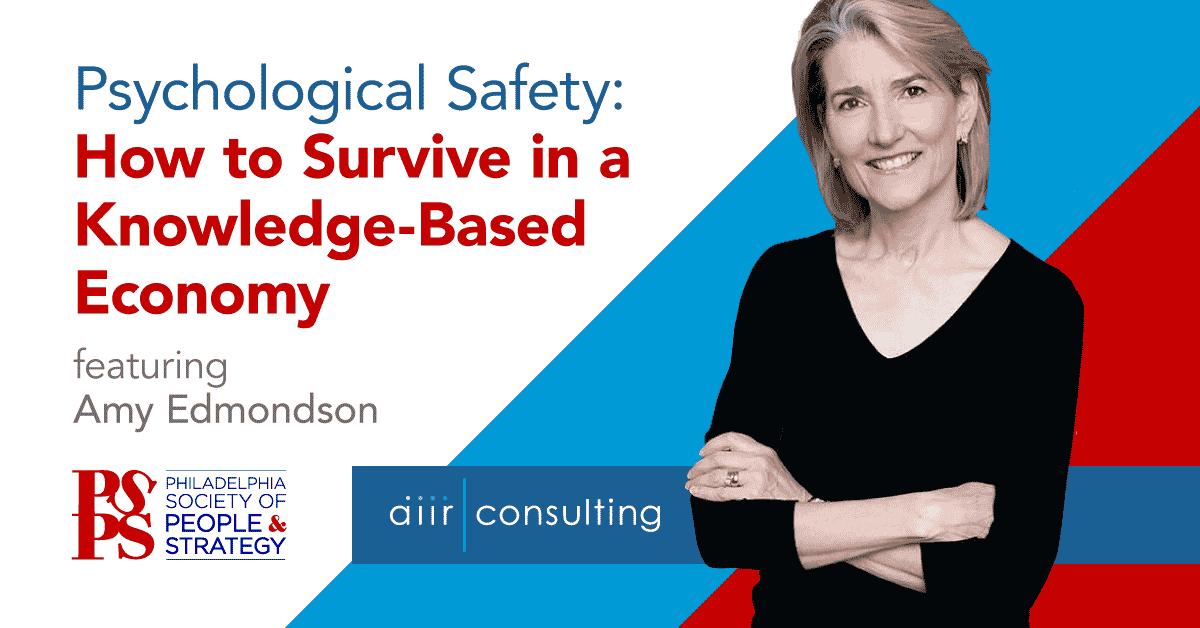
Psychological Safety: How to Survive in a Knowledge-Based Economy
By AIIR Consulting | August 20, 2019
When behavioral scientist Amy Edmondson, now Novartis Professor of Leadership and Management at the Harvard Business School, began studying hospital teams in the 90s, she hypothesized that the highest-performing teams would report the fewest mistakes. Instead, she discovered the opposite — high-performing teams were reporting more errors than their lower-performing counterparts.
Upon further examination, Edmondson’s data revealed that the most effective hospital teams weren’t actually making more mistakes. Rather, these teams were more willing to disclose and discuss their errors, which promoted a culture of learning and continual improvement.
This pioneering study laid the foundation for Edmondson’s study of Psychological Safety, a critical component of team effectiveness and the topic that will be at the center of her keynote presentation, “Building Fearless Organizations for Learning, Innovation & Growth,” at the 13th Annual Philadelphia Society of People & Strategy (PSPS) Leadership Forum. AIIR Consulting is a Program Booklet Sponsor for the event, which will be held Thursday, October 10, at The Loews Hotel in Philadelphia.
In her keynote, Edmondson will discuss the importance of psychological safety for creating a team culture where people are encouraged to ask questions, speak their minds, and present new, innovative ideas.
“We live more and more in a knowledge economy,” Edmondson said. “It is the knowledge and ideas that people…bring that really add value in the marketplace.” However, “the data are overwhelming that many people feel they can’t speak up at work…we are losing enormous value.”
In advance of Edmondson’s keynote, here are three ways to promote psychological safety on your team:
1. Value Candor Over Comfort
Edmondson clarifies that creating psychological safety is not about protecting team members’ feelings. Rather, it’s about practicing candor. High-performing teams create a culture of sharing feedback and holding each other accountable – even when it’s uncomfortable.
2. Frame Mistakes as Learning Opportunities
We are all human and, therefore, will make mistakes. Rather than spending time assigning blame, psychologically safe teams frame challenges and mistakes as learning opportunities. This reframing allows teams to quickly fix issues and move on. And, a thorough post-mortem allows teams to share knowledge and improve processes to prevent similar problems in the future.
3. Lead by Example
In a Harvard Business Review Interview, Edmondson explains, “There are three types of activities that you as a leader have to do. The first one is setting the stage, the second one is inviting engagement, and the third one is responding productively.”
Strong leaders will be the first to acknowledge their mistakes and relate to their team members with empathy and curiosity. Edmondson assures that these leaders are not “soft”, rather they are fiercely determined, highly receptive, and altogether capable of leading a team to success.
Amy Edmondson is the keynote presenter for the13th Annual Philadelphia Society of People & Strategy Leadership Forum, help October 10 in Philadelphia. To register, or for more information, visit https://www.peopleandstrategy.org/2019-leadership-forum.
Are You Ready To Shape A Better Future Together?
Partner with AIIR to empower your leaders and ascend into the future.